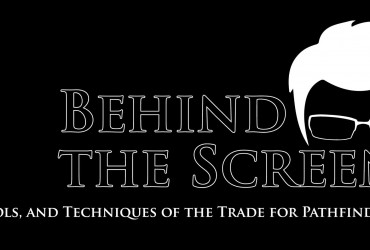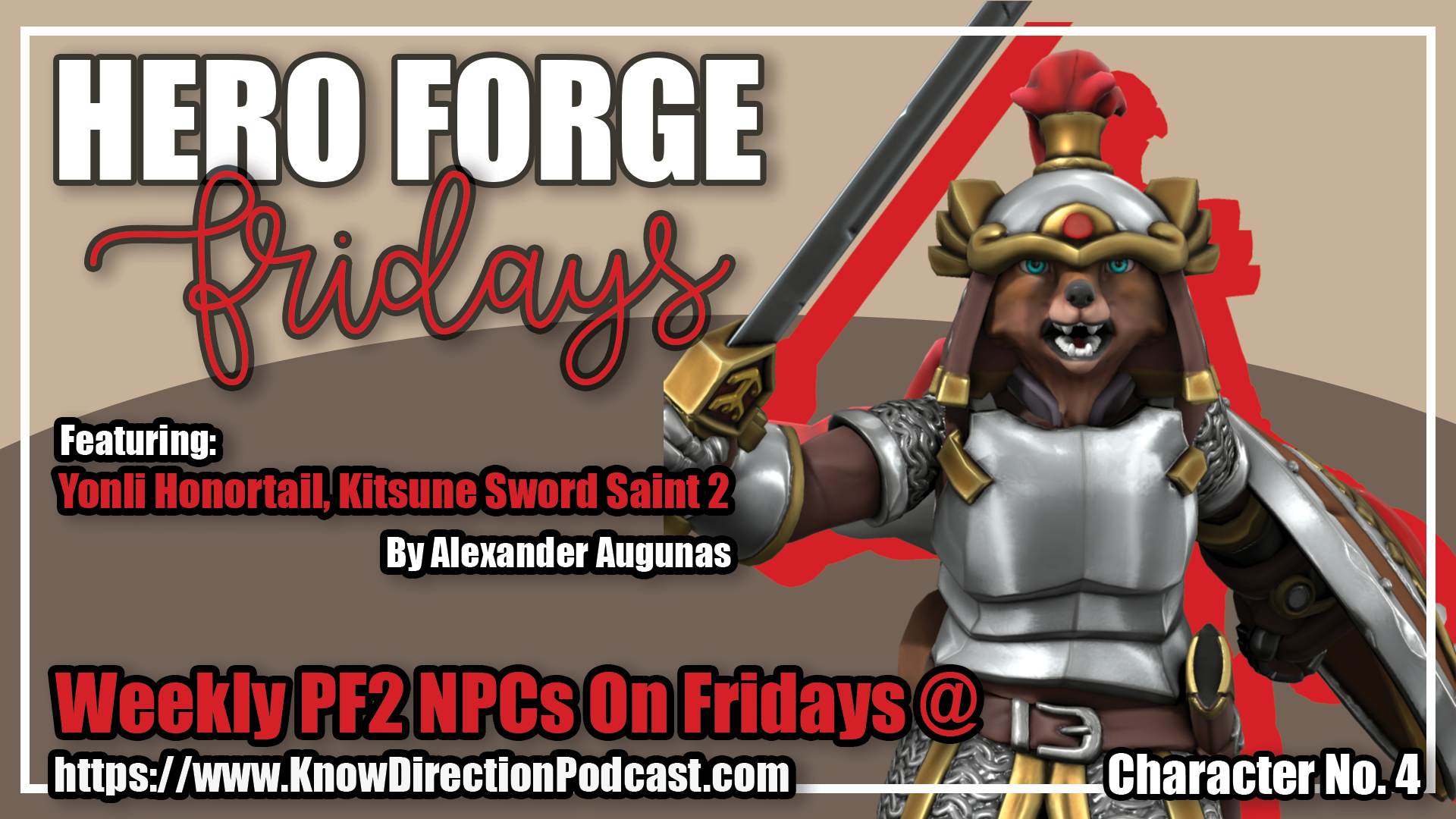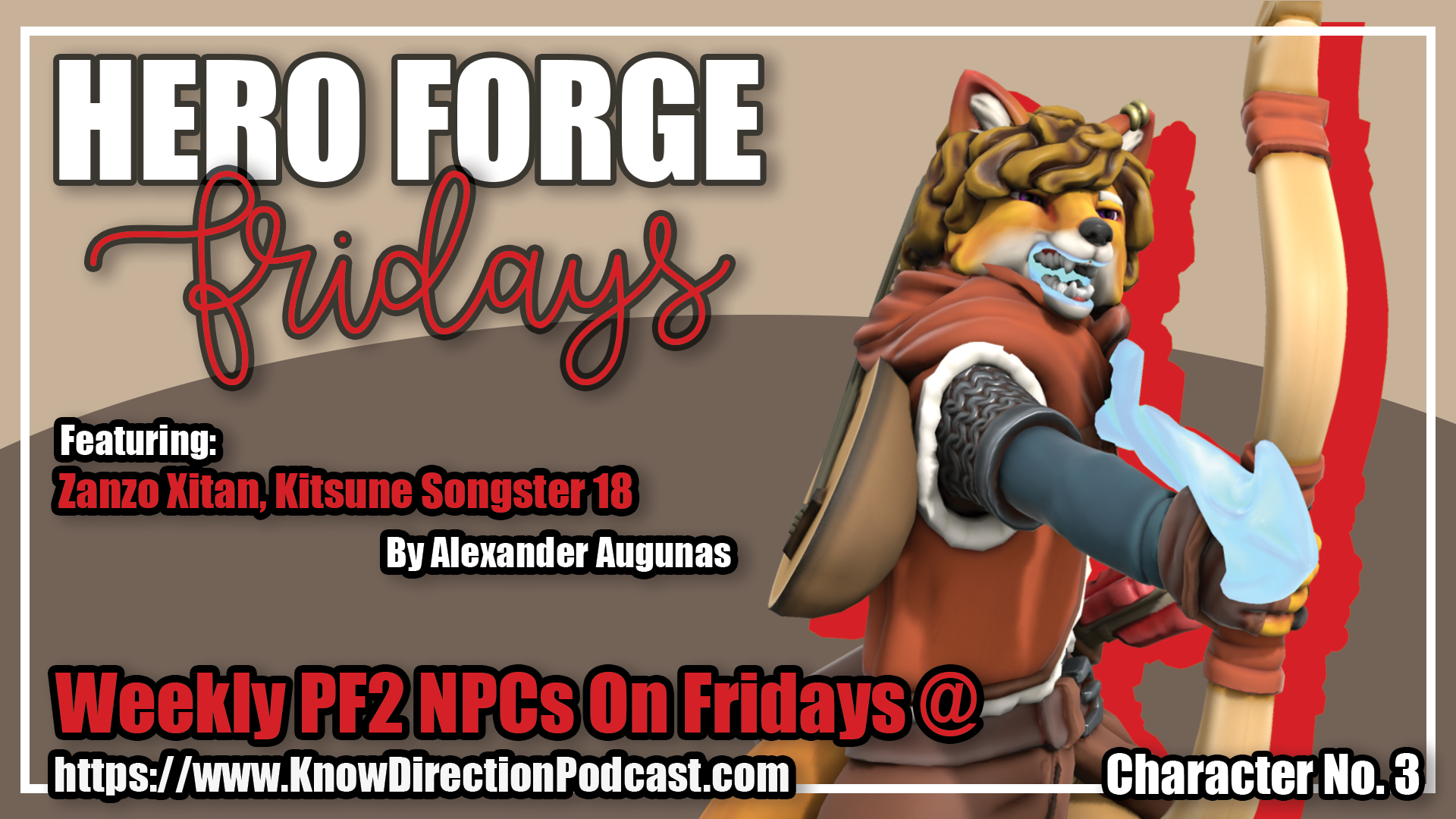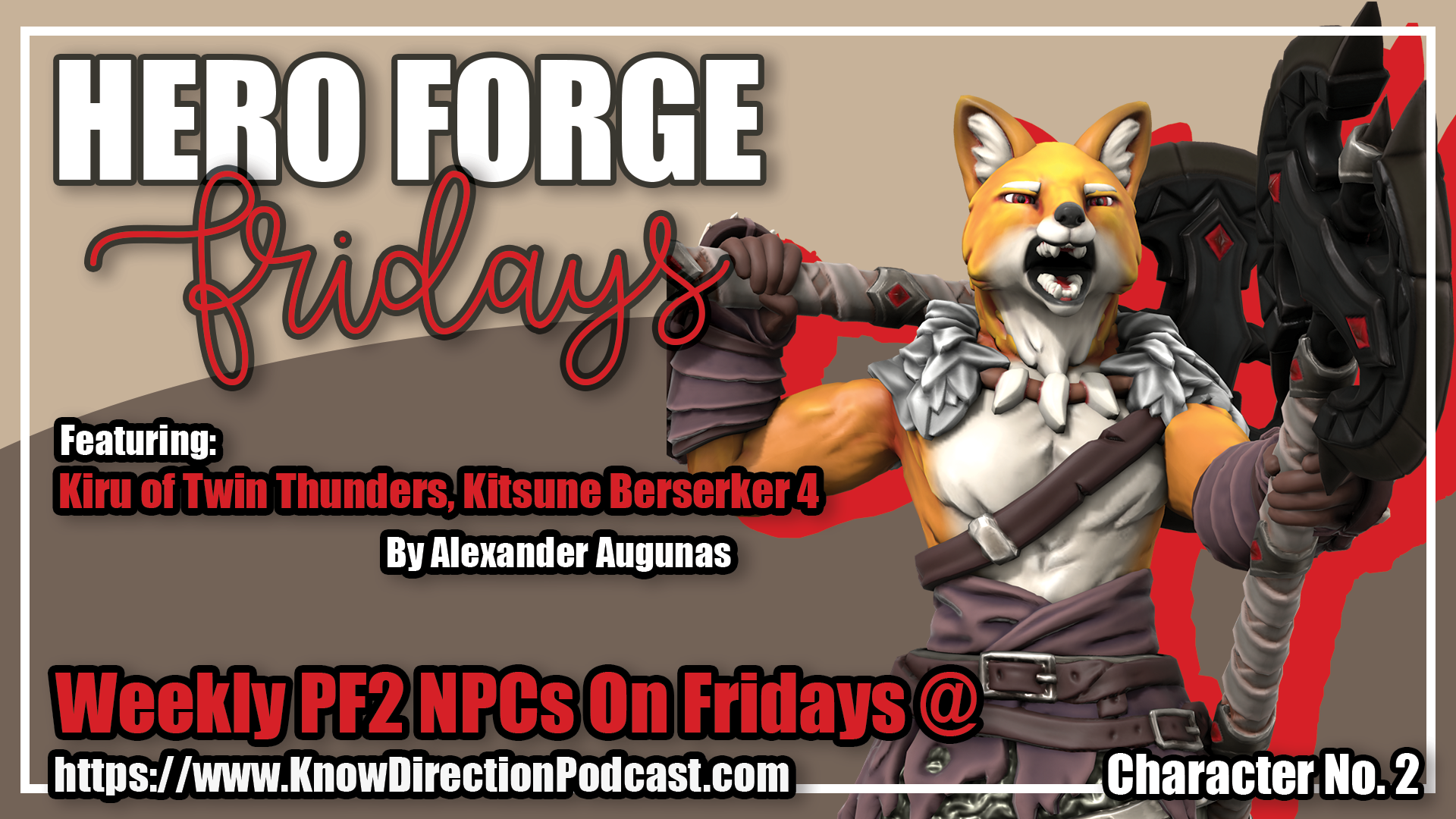Welcome to Guidance, Private Sanctuary’s source for tips and techniques for the Pathfinder Roleplaying Game, written by Everyman Gamer Alexander Augunas. Today, I’ll be sharing my playtest vigilante build here on Iconic Design.
Whenever a playtest comes out, invariably someone asks me, “Alex! What do you think of this class?!” This has held true with the vigilante class, which is set to debut in 2016’s Q2 product Ultimate Intrigue. I have a lot of thoughts on the vigilante, so I figured what better way to share them then to show off my personal Iconic Design for the class: my PFS playtest vigilante, the Bloodhound!
Background
Cyril Takamine was once an ordinary kitsune cartographer working with the Lantern Lodge. Never the adventuring type, Cyril was a geological genius and spent his days charting courses for Pathfinder agents to take in completing their missions. Cyril was praised for his peerless work until one day when a group of agents that he sent on what was supposed to be a quiet trip to Tianjing were ambushed by a group of Aspis Consortium agents who took no survivors. It was weeks before the Lantern Lodge was able to man another mission to find out what fate had befallen the unfortunate Pathfinders, and during that time Cyril was wrought with grief and guilt over what he considered a grievous error on his own part, despite what his peers and supervisors told him. Something changed within Cyril, and soon after he set off for Absolam, claiming that he needed a fresh start in a new port, which included completely eschewing his human identity full-time. Unsurprisingly, Cyril gained a bit of renown around the Grand Lodge as, “that foxfolk cartographer,” and by day, he seemed to continue to perform his duties with a smile, if somewhat sporadically. In truth, Cyril began studying from a wizard’s tomes, teaching himself the finer arts of spell and shadow. At night, Cyril sneaks into groups of Pathfinder agents, the very same agents whose missions he plans, and accompanies them on their dangerous quests as his human alter ego, the Bloodhound, seeking to uphold the Pathfinder Society’s good name, punish the Aspis Consortium wherever he can, and ensure that those agents who follow his expeditions find their way home safely.
Now, who was it that said that I didn’t seem like a guy who cares much about RP flavor? 😉
Build Concept
So obviously this build is going to focus on a single class vigilante build, since the point of a playtest character is to playtest said class. But what, exactly, am I working for? Excellent question! Let’s tune in and see.
- Warlock Specialization: I liked the concept of the warlock specialization, and it was the only specialization that wasn’t covered by my playtest group. Plus magic can be very fun to play and as I was saying to Perram the other day, I don’t play enough spellcasters. So warlock it is!
No archetypes and no multiclassing means that this is a VERY easy build to describe, so let’s move on before you guys get too bored, shall we?
Early Levels (1–7)
- Classes: vigilante 7
- Feats: Point-Blank Shot (1st), Arcane Strike (Bonus), Precise Shot (3rd), Rapid Shot (5th), Two-Weapon Fighting (7th)
- Abilities: dual identity, seemless guise, social talents, startling appearance, vigilante specialization, vigilante talents
- Social Talents: renown (1st), social grace: Profession: cartographer, Diplomacy (3rd), many guises (5th), quick change (7th)
- Vigilante Talents: arcane striker (2nd), mystic bolt (4th), arcane training II (6th)
- Sorcerer/Wizard 1st-Level Spells per Day: 2
Like many people, I love the idea of specializing in magical blasts of energy, so I’m going to specialize as a mystic bolt warlock, likely electricity. (There are fewer creatures with acid resistance, but more creatures with electricity vulnerability. Plus I LOVED Static Shock as a kid.) My battle plan for the early levels is to begin by grabbing everything I need for a standard round. To this end, I pick up the arcane striker talent at 2nd level, largely because it’s one of the few talents available to me at this level that’s worth it long-term. (The other is bomb, which isn’t spectacular at 2nd level because you only have 1d6 damage, no Int to damage, and no discoveries.) At 2nd level, I make the near impossible choice between mystic bolt and 2nd-level spellcasting, and I ultimately choose mystic bolt because its essentially the cornerstone of my build. It’s a tough choice because there’s a pretty good chance that I’m going to run into at least ONE enemy with electricity resistance in the six games between 4th level and 6th level, but vigilantes don’t have any attack roll-boosting abilities, so I need my touch attacks online sooner than later. At 6th level, two levels after the sorcerer, I get my 2nd-level spellcasting.
Social talents, which are an interesting concept, are largely unimportanted to a Pathfinder Society build. I picked renown at 1st level because it matched my backstory of being somewhat famous and social grace at 3rd level because a +4 circumstance bonus to multiple skills of my choice is REALLY good. I took Diplomacy in order to make nice with people and Profession: cartographer so I can be extra good at my Day Job. I also love the idea of disguising myself as a mundane character with many guises, which is why I picked that up, and I feel that it’s a quick sell NOT to take quick change when it becomes available, personally.
Feat-wise, my feats are pretty standard for an archer: Point-Blank Shot and Precise Shot so I don’t take the nasty –4 penalty to hit (plus the attack bonus from Point-Blank Shot is useful), Rapid Shot for an extra attack, and Two-Weapon Fighting. I need to do more sleuthing on this one; I’m not 100% sure if you can use Two-Weapon Fighting in conjunction with ranged mystic bolts or not. The talent says that the bolts function as light one-handed weapons, which would imply that the ranged option functions like throwing said weapons (which would let them work with Two-Weapon Fighting), but I’m not 100% sure. If this is the case, then the vigilante’s damage would be comparable to a gunslinger with a similar set-up, although there’s no double-barrel firearms to gain further attacks.
At this point, my vigilante is more like a rogue with major magic than a proper spellcaster, but having actual options outside of combat is important, in my opinion. Don’t worry; the next few levels of my build are going to get REALLY boring.
Mid Levels (8 –14)
- Classes: vigilante 14
- Feats: Point-Blank Shot (1st), Arcane Strike (Bonus), Precise Shot (3rd), Rapid Shot (5th), Two-Weapon Fighting (7th), Improved Two-Weapon Fighting (9th), Spell Penetration (11th), Greater Spell Penetration (13th)
- Abilities: dual identity, frightening appearance, seemless guise, social talents, startling appearance, vigilante specialization, vigilante talents
- Social Talents: renown (1st), social grace: Profession: cartographer, Diplomacy, Bluff, Perception (3rd), many guises (5th), quick change (7th), great renown (9th), incredible renown (11th), immediate change (13th)
- Vigilante Talents: arcane striker (2nd), mystic bolt (4th), arcane training II (6th), arcane training III (8th), arcane training IV (10th), tattoo chamber (12th), arcane training V (14th)
- Sorcerer/Wizard 5th-Level Spells per Day: 1
- Sorcerer/Wizard 4th-Level Spells per Day: 3
- Sorcerer/Wizard 3rd-Level Spells per Day: 3
- Sorcerer/Wizard 2nd-Level Spells per Day: 3
- Sorcerer/Wizard 1st-Level Spells per Day: 4
Like I said, kind of boring. Herein we run into the main problem with the vigilante: when you get right down to it, none of the talent choices compare to the flexibility of being able to cast more spells per day, especially considering that the designers have said that there will not be an Extra Vigilante Talent feat. It’s sort of a shame, because there are a number of other talents that I really wanted. For example, having shadow jump would have been awesome, but can I really justify taking it when the shadow step spell is exactly the same, save longer distances? How much do I really need that familiar when I could cast haste on myself? Do I really want bond of blood when I could just cast false life? Elemental battle armor when I could cast resist energy? About the only talents that I couldn’t replicate with spells are arcane striker (which I took), educated defense (which I will likely take in the future), mystic bolt / bomb (having both is redundant when its between both and a new spell level), and tattoo chamber (which I’m taking at 12th level).
After all’s been said and done, tattoo chamber is REALLY awesome. The ability to stash a bunch of rods or wands inside your tattoo and either A) not needing to hold them to use them or B) being able to retrieve the mas a swift action is REALLY great. Honestly, you’ll likely want to put wands inside your tattoo and get a glove of storing for your favorite rod, however.
Feat-wise, there isn’t much that really bolsters my mystic bolt build once you get Rapid Shot and Two-Weapon Fighting. Again, assuming that I can use Two-Weapon Fighting from ranged, Improved Two-Weapon Fighting just adds more attacks to my damage potential; even the penalty isn’t a huge wash since touch attacks tend to become more and more effective as your level rises. By level 9, I’d have two attacks from iterative attacks, two more from Two-Weapon Fighting, and one from Rapid Shot; not exactly the same as a gunslinger, but similar with similar penalties. (I think I’m one attack down on them). In addition, my arcane striker ability kicks in at level 12 to apply one of the elemental-based weapon qualities to my mystic bolts; currently its not clear whether damage types stack for the purpose of energy resistance, but overall more damage is more damage.
If you’re wondering why I took the Spell Penetration feats, its because mystic bolt is a spell-like ability, and I really don’t want to deal with what is essentially, “roll all to-hits” against creatures with spell resistance. I’d like my mystic bolts to have a pretty good chance at hitting, and lowering spell penetration is the best way to do it. (Also for my actual spells.)
In terms of my social talents, I had a bad run in one of my playtests where my party accidentally started a chase scenario in a PFS encounter right as my character started changing into his social identity. (This was round 1, so changing took 5 full minutes; I basically sat there for 10 minutes and didn’t play Pathfinder Society.) As a result, I like anything that lowers this time to be as quick as possible, so I picked up quick change back in the early game and immediate change as soon as I could at 13th level. In the meantime, I chose to advance my renown ability further..
One thing that I want to point out is that this character is for Pathfinder Society, and for most characters, progression slows down greatly past 12th level because there are less sanctioned modules to play. By the time my character reaches this threshold, he’ll have taken four spellcasting talents and just two talents of his choice; like I said, most of the talents simply don’t compare to the flexibility of having more spells per day, so I’m guessing that this is going to be VERY common for warlocks and zealots. (In truth, its about all I’ve seen in playtest data.) Hopefully that’ll be addressed, because with the current talent balance I’m confident in saying that if you don’t advance your spellcasting, you’re as suboptimal as an archer without Precise Shot.
On that note, let’s look at the end game!
Endgame (15+)
- Classes: vigilante 20
- Feats: Point-Blank Shot (1st), Arcane Strike (Bonus), Precise Shot (3rd), Rapid Shot (5th), Two-Weapon Fighting (7th), Improved Two-Weapon Fighting (9th), Spell Penetration (11th), Greater Spell Penetration (13th), Improved Precise Shot (15th), Greater Two-Weapon Fighting (17th), Combat Casting (Bonus), Weapon Focus: mystic bolt (19th)
- Abilities: dual identity, frightening appearance, seemless guise, social talents, startling appearance, stunning appearance, vengeance strike, vigilante specialization, vigilante talents
- Social Talents: renown (1st), social grace: Profession: cartographer, Diplomacy, Bluff, Perception, Sense Motive, Knowledge [local] (3rd), many guises (5th), quick change (7th), great renown (9th), incredible renown (11th), immediate change (13th), everyman (15th), instant recognition (17th), any guise (19th)
- Vigilante Talents: arcane striker (2nd), mystic bolt (4th), arcane training II (6th), arcane training III (8th), arcane training IV (10th), tattoo chamber (12th), arcane training V (14th), arcane training VI (16th), caster’s defense (18th), mystic bolt: acid (20th)
- Sorcerer/Wizard 6th-Level Spells per Day: 1
- Sorcerer/Wizard 5th-Level Spells per Day: 3
- Sorcerer/Wizard 4th-Level Spells per Day: 3
- Sorcerer/Wizard 3rd-Level Spells per Day: 3
- Sorcerer/Wizard 2nd-Level Spells per Day: 3
- Sorcerer/Wizard 1st-Level Spells per Day: 4
End game! I round out my feat choices with Improved Precise Shot (say goodbye to ordinary cover and concealment), Greater Two-Weapon Fighting, and Weapon Focus (for when there’s nothing else to take). I also grab everyman (be almost anyone), instant recognition (quickly move my area of renown), and any guise (literally be anyone) as my social talents and arcane training VI (a no-brainer), caster’s defense (Combat Casting with benefits), and the ability to deal acid damage with my mystic bolts.
Also, stunning appearance and vengeance strike pop online. Other then that, the build is pretty straight-forward.
Current Thoughts on the Vigilante and Warlock
I’ll end the article with my current thoughts on the vigilante, as of round 2. Social talents are an awesome idea, although there needs to be more variety in what is available to the vigilante. I like being able to choose what I get and when as opposed to the old system, where everything was predefined for you. The avenger and stalker are looking pretty good, but I think that the avenger’s base ability is weaker than the stalker’s. +2.5 damage at every odd level is MUCH more powerful than full base attack bonus, in my opinion, and that’ll only be more true when the stalker catches his opponent unaware for an average of +4.5 damage instead. Also, the vigilante has a unified social identity, but the base class has nothing vigilante-wise to keep it uniform. As cool as they are, the “appearance” abilities feel like random homages to Batman rather than important features of the class; half the time, when I was designing this warlock build I kept forgetting that they even existed because most of them don’t seem to apply much to the spellcasters until later levels.
For the warlock specifically, the modular talent design is a problem. The fact remains that there are no choices in the talent tree that can actually equal spellcasting in power or flexibility. (This is in part because the warlock and zealot talents were designed to be weaker than additional spells per day; the avenger and vigilante talents hold up much better to spellcasting because they do a lot more for those types of characters than the the warlock and zealot talents do for warlock and zealots, respectfully. In my educated opinion as a designer, I’m willing to guess that the specializations were not only balanced against other classes that fulfill each specialization’s role, but also against one another. That’s not a good design path to take. You’ll have a difficult time convincing me that the rogue or fighter was designed against the cleric with the same cutting edge that the zealot seems to be designed against the stalker, for instance. And that isn’t to say that the designers should accept that the spellcasting specializations will be more powerful that the melee ones (although the fans will likely say that they are), but there are other ways to balance things out.
For my opinions on how to improve the class, first, vengeance strike should be a Level 1 ability. Currently, the vigilante is missing something cool and iconic to do at Level 1 and the class currently doesn’t have a design niche in combat. On Know Direction, Jason Bulhman said that the designers envisioned the vigilante as, “the class that does the best on Turn 1.” Taking vengeance strike, granting it at level 1, and staggering the number of rounds that the vigilante could study an opponent for across the breadth of his career would help give the vigilante an identity as well as give it something cool and unique to do at level 1; to clarify, I’m saying that the vigilante could study for a maximum of 1 round at level 1, 2 rounds at level 5, 3 rounds at level 10, 4 rounds at level 15, and 5 rounds at level 20. Naturally, some new capstone would need to be added, and I have a suggestion for that too: traumatic appearance. Basically, it would work like frightening, stunning, and startling appearance, except the target would need to make a Will saving throw or fall unconscious. I really like the idea of someone being so afraid of Batman that they pass out in fear; it fits this class well.
For my opinions on how to improve specializations, bake spellcasting strait into the base ability. Instead of the wonky progressions used now, use the bard spell progression (but not list) for the warlock and the inquisitor spell progression (but not list) for the zealot. Hidden strike (the stalker’s base ability) is fine as-is, but avengers need something else to boost them up; I’m thinking bonus hit points to help mend the gap between the vigilante and other full base attack bonus classes, personally. From there, I have specific ideas for each specialization:
- Avenger: Overall, this class has great talents and would be well off if its base ability was more in-line with the stalker’s.
- Stalker: By far, this is the best specialization. It doesn’t need help; it somehow manages to be a great parallel to the rogue.
- Warlock: The warlock needs more talent choices beyond what it has. It also needs changes to its spellcasting base ability for all the reasons I mentioned in this article: most of the talents don’t do anything that couldn’t be done better with a few scrolls form the sorcerer/wizard spell list. Overall, choice among warlock talents is a false one, sort of like talents in Pre-Mist of Pandaria World of Warcraft. Yes, you had the freedom to spend your talents any way that you want, but because balance between the talents isn’t equal, there is a right way to play and a wrong way to play, and its no fun to have “talent traps” in your build, and that’s basically what the vigilante is; punishment for choosing spellcasting over the fighter or the rogue with boring talent choices, or overall weak options should you try to ignore the best option.
- Zealot: As with the warlock, plus a comment on the divine powers. Having a source for the zealot’s powers is a great idea. That said, aiding an all-new submechanic like this is boring, plus the choices that are presented are really bottom of the barrel. I mean, this is now the third class that we’ve seen abyssal=claws as an option for (sorcerer and bloodrager). Instead, a better option would be to allow the zealot to pick a cleric domain to function as the source of her divine powers. The zealot gets that domain’s domain powers and adds its spells (up to 6th level) to her list of spells known. This is something that inquisitors don’t get, so it would help to solidify the zealot’s role as the more magical character between the two of them. Additionally, the current zealot has this cool option where it can effectively take the hunter spell list instead of the inquisitor spell list. This is an awesome idea, and it could be preserved as a special option for zealots that choose a druidic domain (Air, Animal, Earth, Fire, Plant, Water, Weather, an animal domain, or a terrain domain). Animal domains could be treated as the Animal Domain for talent prerequisites while terrain domains could be treated as the Plant Domain. Not only would this keep the class from needing a secondary, all-new mechanic just for it, but it would keep the current theme while expanding the breadth of the class in a new, exciting way.
And that’s all I have to say on the vigilante! If another of playtesting comes out, I’ll try to share my thoughts on that too. In the meantime, I’m signing off until next Monday, so I’ll see you then for another all-new installment of Guidance!
Alexander “Alex” Augunas has been playing roleplaying games since 2007, which isn’t nearly as long as 90% of his colleagues. Alexander is an active freelancer for the Pathfinder Roleplaying Game and is best known as the author of the Pact Magic Unbound series by Radiance House. Alex is the owner of Everyman Gaming, LLC and is often stylized as the Everyman Gamer in honor of Guidance’s original home. Alex also cohosts the Private Sanctuary Podcast, along with fellow blogger Anthony Li, and you can follow their exploits on Facebook in the 3.5 Private Sanctuary Group, or on Alex’s Twitter, @AlJAug.






I’m reading the playtest as I read this. I cannot find what you’re calling Social Talents anywhere. Sure there is the Renown and the Social Grace, both of which you mention during the 1-7 level. However, both of them are fixated features that you get and given levels. They are not features that you get to choose whenever you want to. I cannot find Seemless Guise though.
Was there an update on the playtest after the initial release?
Yes, Round 2 came out about a week ago.